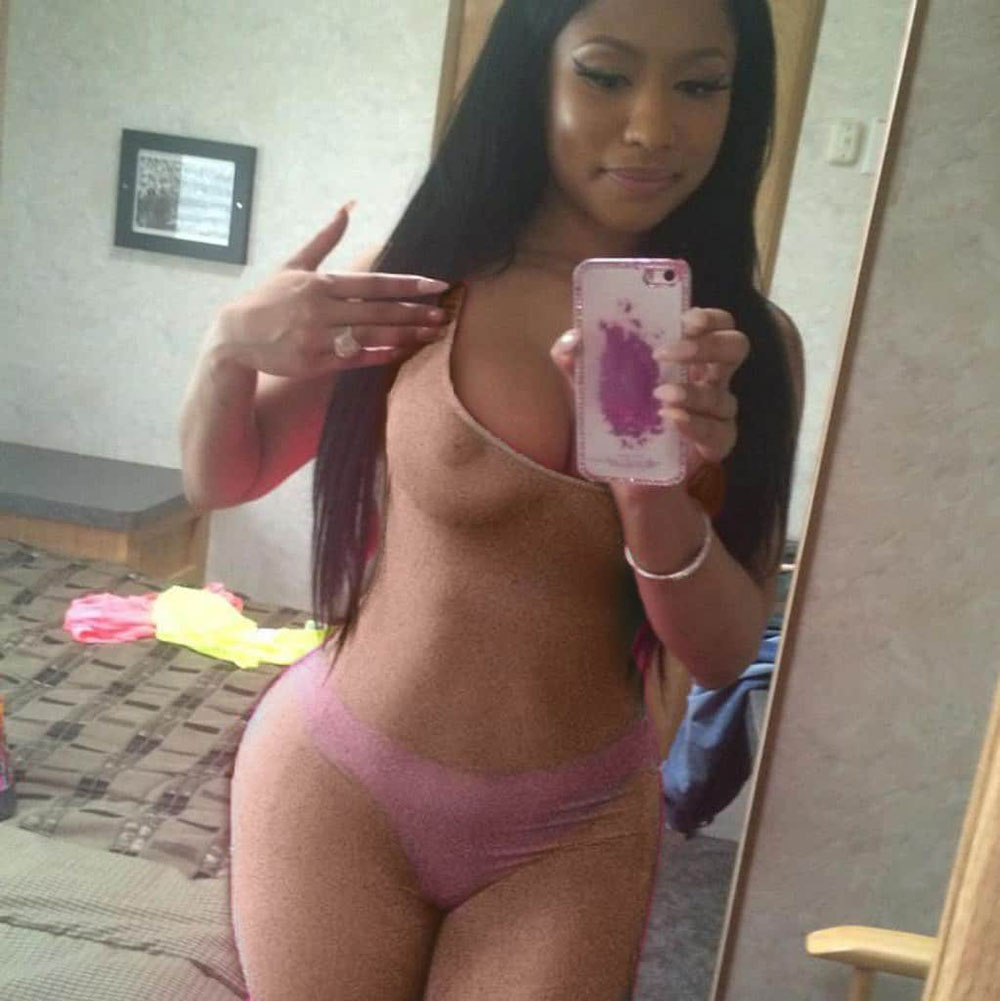Unpacking The Impact Of "Nicki Minaj Leaked" Incidents
In an era dominated by digital connectivity, the concept of privacy, especially for public figures, has become increasingly complex. The phrase "Nicki Minaj leaked" often surfaces in online discussions, highlighting a broader societal concern about digital security, celebrity vulnerability, and the ethical implications of sharing private information without consent. This article delves into the multifaceted aspects surrounding such incidents, exploring their impact on individuals, the entertainment industry, and the wider digital landscape.
Understanding these occurrences requires a nuanced perspective, moving beyond sensational headlines to examine the underlying issues of data privacy, legal boundaries, and the responsibility of online communities. We will explore how alleged leaks affect a celebrity's image and career, the legal recourse available, and the crucial lessons these incidents offer for digital safety in an increasingly transparent world. This discussion is vital for anyone navigating the complexities of online information, whether as a public figure or a private citizen.
Table of Contents
- The Digital Age and Celebrity Privacy: Understanding "Nicki Minaj Leaked" Incidents
- The Complexities of Celebrity Image and Public Perception
- Navigating the Aftermath: Legal and Personal Repercussions
- The Role of Social Media and Fan Culture
- Beyond the Headlines: Protecting Personal Information in the Digital World
- A Deeper Look into the Psychology of Online Leaks
- The Evolution of Celebrity Privacy in the Internet Era
- Nicki Minaj: A Brief Biography and Her Stance on Privacy
The Digital Age and Celebrity Privacy: Understanding "Nicki Minaj Leaked" Incidents
In the rapid evolution of the internet, the line between public and private life has become increasingly blurred, especially for global icons like Nicki Minaj. The term "leaked" typically refers to the unauthorized release of private or confidential information, which can range from personal photos and videos to unreleased music or sensitive documents. When such incidents involve high-profile personalities, they quickly become global news, sparking widespread discussion about digital ethics, cybersecurity, and the fundamental right to privacy.
The prevalence of social media platforms and instant messaging applications has created new avenues for information to spread, making it challenging to contain unauthorized disclosures once they occur. For celebrities, this means a constant vulnerability to their personal lives being exposed, often without their consent or knowledge. The public's insatiable curiosity about celebrity lives, combined with the ease of digital sharing, creates a fertile ground for "leaked" content to proliferate, making it a significant challenge for individuals and their management teams to control their narrative and protect their private sphere.
What Constitutes a "Leak" in the Digital Sphere?
A "leak" in the digital context is broadly defined as the disclosure of information that was intended to remain private or confidential, released without authorization. This can encompass a wide array of content:
- Personal Media: Private photos, videos, or audio recordings that were never meant for public consumption.
- Unreleased Content: Demos, tracks, or footage from creative projects that have not been officially released.
- Confidential Communications: Private messages, emails, or documents that reveal personal or business details.
- Sensitive Data: Financial information, health records, or other highly personal data.
The impact of a leak can vary depending on the nature of the content and the celebrity involved. For an artist like Nicki Minaj, whose brand is meticulously crafted, an unauthorized release can not only be a deeply personal violation but also a strategic setback, potentially affecting endorsements, public image, and professional relationships. The digital sphere, while offering unparalleled connection, also harbors significant risks to personal and professional integrity.
The Complexities of Celebrity Image and Public Perception
For a celebrity, image is everything. It's carefully constructed through public appearances, music, interviews, and social media interactions. When incidents like "Nicki Minaj leaked" surface, they can severely disrupt this carefully managed persona. The public's perception can shift dramatically, sometimes leading to empathy and support, but often resulting in judgment, speculation, or even further exploitation of the leaked material.
The challenge for public figures lies in regaining control of their narrative. A leak can force them to address deeply personal matters publicly, which can be emotionally taxing and strategically difficult. It can also lead to a loss of trust from fans and collaborators, or worse, open them up to blackmail or harassment. The constant scrutiny and the pervasive nature of online sharing mean that once information is "out there," it's incredibly difficult, if not impossible, to fully erase it from the internet. This permanent digital footprint adds another layer of complexity to managing a public image in the face of unauthorized disclosures.
Navigating the Aftermath: Legal and Personal Repercussions
The immediate aftermath of a "Nicki Minaj leaked" incident involves a complex web of legal, public relations, and personal challenges. From a legal standpoint, unauthorized disclosure of private information can constitute various offenses, including invasion of privacy, copyright infringement, and in some cases, even revenge porn laws. Celebrities and their legal teams often pursue aggressive action to have the content removed from websites and to identify and prosecute those responsible for the leak.
However, the global nature of the internet makes enforcement incredibly difficult. Content can be mirrored across countless sites, and identifying anonymous perpetrators can be a monumental task. Personally, the toll can be immense. Beyond the professional damage, victims of leaks often experience significant emotional distress, anxiety, and a profound sense of violation. The public scrutiny and potential for online harassment further exacerbate these feelings, highlighting the severe human cost behind these digital breaches.
The Battle for Control: Copyright and Digital Rights
One of the primary legal avenues pursued in the wake of content leaks is copyright infringement. If the leaked material includes creative works (like unreleased music or videos), the artist retains copyright, giving them legal standing to demand its removal. Similarly, for personal images or videos, laws regarding digital rights and privacy come into play. Many jurisdictions have enacted "revenge porn" laws, making it illegal to distribute intimate images without consent, providing a crucial layer of protection for victims.
However, the practical enforcement of these rights remains a significant challenge. The speed at which content spreads online often outpaces legal responses. Digital Millennium Copyright Act (DMCA) takedown notices are frequently used to compel platforms to remove infringing content, but this is often a game of whack-a-mole, with new copies appearing as quickly as old ones are removed. This ongoing battle for control underscores the need for robust legal frameworks and proactive digital hygiene strategies to mitigate the risks of unauthorized dissemination.
The Role of Social Media and Fan Culture
Social media platforms play a dual role in "Nicki Minaj leaked" situations. On one hand, they are often the primary vectors for the rapid dissemination of leaked content, amplified by algorithms that prioritize engagement. On the other hand, they also serve as platforms for celebrity response, fan support, and collective action against the spread of harmful material. Fan communities, while sometimes inadvertently contributing to the spread of rumors, can also mobilize to defend their idols, report abusive content, and advocate for greater digital privacy.
The virality of information on platforms like Twitter, Instagram, and TikTok means that a leak can reach millions within hours. This immediate and widespread exposure makes it incredibly difficult for celebrities to control the narrative or prevent the content from becoming ingrained in public consciousness. The challenge for social media companies is to balance free speech with the need to protect users from harassment and the unauthorized distribution of private information, a balance that remains contentious and constantly evolving.
Beyond the Headlines: Protecting Personal Information in the Digital World
While "Nicki Minaj leaked" incidents highlight the extreme vulnerabilities of public figures, they also serve as a stark reminder for everyone about the importance of digital security. In an age where our lives are increasingly online, protecting personal information is paramount. Whether you're a celebrity or an everyday internet user, understanding and implementing robust cybersecurity practices is no longer optional but essential. The same vulnerabilities that affect high-profile individuals can, in different forms, affect anyone.
This includes being vigilant about phishing attempts, using strong, unique passwords, enabling two-factor authentication, and being cautious about what information is shared online, even in seemingly private settings. The digital world is a shared space, and while we enjoy its conveniences, we must also be aware of its inherent risks and take proactive steps to safeguard our digital footprint. Education and awareness are the first lines of defense against unauthorized access and dissemination of personal data.
Best Practices for Digital Security
To minimize the risk of personal information being compromised, consider adopting these essential digital security practices:
- Strong, Unique Passwords: Use a combination of uppercase and lowercase letters, numbers, and symbols. Avoid easily guessable information. Use a password manager.
- Two-Factor Authentication (2FA): Enable 2FA on all accounts that offer it. This adds an extra layer of security beyond just a password.
- Be Wary of Phishing: Do not click on suspicious links or open attachments from unknown senders. Verify the sender's identity before providing any personal information.
- Regular Software Updates: Keep your operating system, web browser, and all applications updated. Updates often include critical security patches.
- Secure Wi-Fi Networks: Avoid public, unsecured Wi-Fi for sensitive transactions. Use a Virtual Private Network (VPN) when connecting to public Wi-Fi.
- Review Privacy Settings: Regularly check and adjust privacy settings on social media and other online accounts to control who sees your information.
- Backup Data: Regularly back up important files to an external hard drive or cloud service.
- Be Mindful of Sharing: Think twice before sharing personal photos, locations, or sensitive details online, even with friends.
A Deeper Look into the Psychology of Online Leaks
The phenomenon of "leaked" content, particularly involving celebrities, reveals intriguing aspects of human psychology and societal behavior. On the one hand, there's the voyeuristic curiosity that drives clicks and shares, a desire to peek behind the curtain of fame. This curiosity, however, often overlooks the real human being at the center of the controversy, reducing them to mere spectacle. On the other hand, the act of leaking itself can stem from various motivations: malice, revenge, financial gain, or even a misguided sense of justice or anti-establishment sentiment.
For the perpetrators, there can be a sense of power or notoriety derived from exposing a celebrity's private life. For the consumers of such content, it can be a form of entertainment, a topic for gossip, or a way to feel closer to the lives of the famous. This collective behavior, however, normalizes the violation of privacy and contributes to a culture where personal boundaries are increasingly eroded. Understanding these psychological underpinnings is crucial for developing more effective strategies to combat the spread of unauthorized content and foster a more respectful online environment.
The Evolution of Celebrity Privacy in the Internet Era
The concept of celebrity privacy has undergone a dramatic transformation with the advent of the internet. Before the digital age, unauthorized disclosures were largely limited to tabloid magazines and paparazzi photos, often physical prints that were harder to widely disseminate. The internet, however, has democratized the ability to publish and share, making every individual a potential publisher and every piece of content a potential viral sensation. This shift has profoundly impacted how celebrities manage their public and private lives.
From early instances of celebrity nude photo hacks to more recent deepfake controversies, the threats to privacy have evolved in sophistication and scale. The legal frameworks are constantly playing catch-up, attempting to regulate a rapidly changing technological landscape. The ongoing debate about "the right to be forgotten" and stricter data protection laws (like GDPR) reflects a growing societal recognition of the need to protect personal data in the digital realm, even for those in the public eye. The journey towards establishing robust digital privacy rights for all, including figures like Nicki Minaj, is far from over.
Lessons Learned and Future Outlook
The numerous incidents of "leaked" content involving celebrities have offered invaluable, albeit painful, lessons. They underscore the critical importance of robust cybersecurity measures for everyone, regardless of their public profile. They highlight the need for platforms to take greater responsibility in moderating content and protecting user data. Furthermore, these events have spurred conversations about digital literacy, empathy, and the ethical responsibilities of online users.
Looking forward, the future of digital privacy will likely involve a combination of technological advancements, stronger legal protections, and a greater emphasis on user education. Blockchain technology could offer new ways to secure digital assets and verify authenticity. AI could be used to detect and remove unauthorized content more efficiently. Ultimately, fostering a culture of respect for privacy online, where the unauthorized sharing of personal information is universally condemned, will be key to creating a safer and more ethical digital future for all.
Nicki Minaj: A Brief Biography and Her Stance on Privacy
Onika Tanya Maraj-Petty, widely known as Nicki Minaj, is a Trinidadian-born rapper, singer, songwriter, and actress who has become one of the most influential and successful female artists in music history. Born on December 8, 1982, in Saint James, Trinidad and Tobago, she moved to Queens, New York, at a young age. Her unique flow, diverse vocal styles, and distinctive fashion sense quickly propelled her to global stardom, earning her numerous accolades and a massive fan base.
Throughout her career, Nicki Minaj has consistently navigated the intense scrutiny that comes with celebrity. Like many public figures, she has faced various challenges related to her privacy, including instances where personal information or unreleased content has allegedly surfaced without her consent. She has often used her platform to speak out against the violation of privacy, advocating for greater respect for artists' personal boundaries and intellectual property. Her experiences highlight the ongoing struggle for control over one's narrative and image in the digital age, underscoring the vulnerability even of the most powerful voices in entertainment.
| Attribute | Detail |
|---|---|
| Full Name | Onika Tanya Maraj-Petty |
| Known As | Nicki Minaj |
| Date of Birth | December 8, 1982 |
| Birthplace | Saint James, Trinidad and Tobago |
| Nationality | Trinidadian-American |
| Occupation | Rapper, Singer, Songwriter, Actress |
| Genres | Hip Hop, Pop, R&B |
| Years Active | 2004–present |
Conclusion
The discussions surrounding "Nicki Minaj leaked" incidents serve as powerful reminders of the ongoing battle for privacy in our hyper-connected world. These events are not merely celebrity gossip; they are symptomatic of broader issues concerning digital security, legal rights, and ethical conduct online. They underscore the immense personal and professional toll that unauthorized disclosures can take on individuals, regardless of their public status.
As digital citizens, it is our collective responsibility to foster an online environment that respects privacy and condemns the unauthorized sharing of personal information. By understanding the mechanisms of leaks, advocating for stronger digital protections, and practicing vigilant cybersecurity, we can contribute to a safer internet for everyone. Let these incidents be a catalyst for greater awareness and proactive measures. What are your thoughts on digital privacy in the age of celebrity? Share your insights in the comments below, or explore our other articles on cybersecurity best practices and celebrity rights.

Nicki Minaj Nude The Fappening (13 Leaked Photos) | #The Fappening

Nicki Minaj NUDE leaked pics and Sex Tape in confirmed PORN Video

Nicki Minaj Nude The Fappening (13 Leaked Photos) | #The Fappening